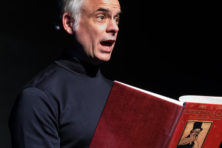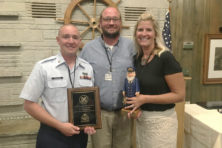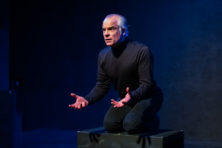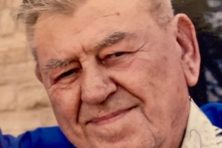Jacob Mueller Launches PAINCAVE
- Share
- Tweet
- Pin
- Share

Jacob Mueller may not strike you as a competitor upon introduction – easygoing, friendly and relaxed – until he straps on his bike helmet and mounts his Giant Propel or tosses around a pigskin or enters the Fish Creek Winter Festival’s kickball tournament. He transforms – focused, alert and aggressive.
“I was a traditional Wisconsin boy,” says Mueller. “I did football and track. Football was life! Competitive spirit and drive was always in our family. We were active all the time.”
The former professional cyclist still thrives on competition, on pushing himself, and pushing others to become fitter, emotionally and physically, through exercise.
“Someone today is going skiing or going hiking,” he says, sipping coffee and gazing out a window with a view of Peninsula State Park, “when you do that, you feel good and that spreads to other people. A little activity makes you a better friend, a better sister, better at your job.”
Discovering that natural high from physical activity early on and becoming admittedly addicted to that high, Mueller kept himself busy with organized sports during his high school days at St. Mary’s Springs Academy in Fond du Lac. After graduating from the University of Wisconsin – La Crosse, where he double majored in Exercise Physiology and Sports Management, Mueller became a “ski bum” for a few years in Colorado and in 2006 took his first “real job” in Philadelphia, Pennsylvania, at MRI Power, where he recruited engineers.

Photo by Maria Quiroga.
“I was 25 years old. I had never lived in the Northeast, never had a ‘real job.’ I struggled my first few months,” recalls Mueller. “How do people do this? Go to the office at 8 am. It felt wrong to have to put in time to get paid. I want to work really hard for two hours and then go play for the rest of the day.”
In search of an outlet, Mueller bought a road bike. “I used that bike as a means of venting: I miss my family, I hate the Northeast, I don’t know what I’m doing with this job,” he laughs. “I was really fast.”
Mueller signed up for group rides to meet fellow cyclists, then signed up for races, “and then you win,” he smiles, “which led to getting picked up by a pro team called Kelly Benefit Strategies.”
Mueller admits that his path to professional cycling is a rare one. “I was really late to the sport,” he says. “Most pro cyclists go the route that you should go – racing as teenagers. I did the Wisconsin model of track, basketball, football – that’s great, but if you want to be really good you need to be racing as a teenager.”
But he was really good and made a living out of traveling around the country, competing against other professional bicyclists. “There’s not nearly as much money in cycling as in the NFL,” he admits, “but they pay for travel, food, they send you bikes and clothes and helmets, shoes, nutrition stuff, and you get a paycheck. You can live on it, but more important – it’s fun! You’re in your 20s, traveling all over the country, racing, getting paid to do what you love to do. I had no idea I was going to do this. I just rode my bike because it made me happy.”
For four years, Mueller trained 30 to 35 hours a week. “When you’re not on your bike, you’re on your back recovering because you got to get up and take a five-hour ride the next day,” he explains.
He trained with triathlete Michael Egan, who had the same coach – Canadian cyclist Brian Walton, an Olympic silver medalist. “We were living in Philly, training in Philly, we had the same coach, overlapping workouts,” explains Mueller. “When we had really hard workout days we called it the ‘pain cave.’”
That became the name of their shared business, PAINCAVE, up and running for a little more than a year. “PAINCAVE is like Netflix for endurance athletes,” explains Mueller. “We have members that pay a monthly fee and have unlimited access to training episodes. It is very strong on the cycling side of the endurance world, but we have running videos, swimming videos. We’ve become this hub of information for endurance athletes – worldwide.”
The idea for the business began to take shape when Mueller and Egan agreed that they could not be professional endurance athletes for much longer.
“I wanted an exit strategy,” says Mueller. “We were both getting to a point in our lives where we couldn’t do this anymore. It’s fun, but you got to draw the line.”
Mueller was also eager to relocate back to Wisconsin. “We started a business plan together that would allow me to live in Wisconsin and work from home and still be tied to the endurance world,” says Mueller.
Through a few twists and turns, Mueller ended up in Door County, where he works on PAINCAVE, trains for his amateur cycling team Stan’s NoTubes, and coaches five athletes.
“It’s gorgeous around here. It’s beautiful riding around here,” says Mueller. “In my short stay thus far – I’ve learned there is quite a large community of cyclists and active people in general. I get a sense that there’s a strong endurance community up here because of the way people are motivated and driven.”
With that in mind, Mueller stresses that PAINCAVE is not just for extreme endurance athletes. “Our target market is not me – high-end racing people,” he says. “It’s for people who want to do a MS charity ride and have no idea how to get ready. Our goal is to change people’s lives – get people off the couch, inspire people to change lives through activity.”
To learn more about PAINCAVE, visit paincave.com.




